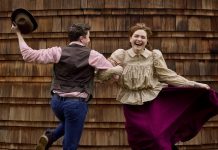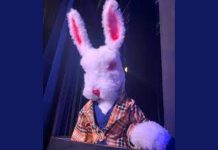Schopenhauer once said,“Talent hits a target that no one else can hit. Genius hits a target that no one else can see.” These words are uniquely apposite to describe the genius of Bertolt Brecht. Brecht, who referred to Hitler as “the house painter,” lived under a very real threat as the Nazis took over Berlin; as Peter Watson notes in The German Genius (HarperCollins 2010), he left Germany the day after the Reichstag fire, leaving behind his address book with Hannah Arendt’s name and phone number, which caused her to be arrested and spend 8 days in jail. That was February 28, 1933; on May 10th, his books were burned, along with those of many other writers, according to biographer Frederic Ewen in Bertolt Brecht: His Life, His Art, & His Times (Carroll Publishing Group, 1992).

Kathleen Turner as Mother Courage in ‘Mother Courage and Her Children’ at Arena Stage at the Mead Center for American Theater January 31-March 9, 2014. Photo by Teresa Wood.
In her marvelous production notes on the play, Molly Smith says: “Trust in our elected officials on Capitol Hill is at 10%, confidence in our banks and financial systems is at an all-time low, deep suspicions abound about our religious systems and America is in the middle of her own 30-year war.” Rampant prejudice; enormous chasms between rich and poor; constant and disheartening political tensions; as Smith notes, these themes make the play only too relevant for today.
Mother Courage and her Children is one of Brecht’s most famous plays, and one of his greatest. “If the theatre is capable of showing the truth,” Brecht said in the Foreward to Antigone, (Brecht on Theatre: The Development of an Aesthetic, ed. & trans. by John Willett, Hill & Wang 1964, “BT”) then it must also be capable of making the sight of it a pleasure.” In this Mother Courage, Artistic Director Molly Smith is able to do both. The vivid David Hare translation, the flawless acting, and the striking combination of movement, music and design make this a production that you simply cannot miss.
Kathleen Turner’s performance is riveting; her Mother Courage has wit, courage, and sexuality, along with an overwhelming preoccupation with her business, and an incandescent determination to survive and keep her family alive. Her singing debut is quite a success: her voice, the traditional whiskey baritone, is perfect for the haunting and explosive music which permeates the play.
Brecht has said about Mother Courage: “The play was written in 1938, when the writer foresaw a great war; he was not convinced that humanity was necessarily going to learn anything from the tragedy which he expected to strike it.” (BT). Brecht wrote in the shadow of the Nazis, when no one knew whether the Third Reich would prevail. It is remarkable to think of the courage of this man, who as a poet and playwright left us so much work of extraordinary quality in the face of some of the greatest horrors of his time.
The play was first produced in Zurich in 1941, and then by Brecht and Erich Engel with Helene Weigel in the title role at the Deutsches Theatre in Berlin, 1949. According to Brecht’s Model for the production, the purpose of the play was to show “That in wartime big business is not conducted by small people. That war is a continuation of business by other means, making the human virtues fatal even to those who exercise them. That no sacrifice is too great for the struggle against war.” (BT)
It is the story of Mother Courage’s desperate attempts to survive and preserve her family, in the middle of the Thirty Years’ war (1624-1636) which killed 8 million people and, as Peter H. Wilson notes in Europe’s Tragedy; A New History of the Thirty Year’s War (Allen Lane 2009), became for German and Czech history the kind of traumatic and defining event that the Civil War was for the United States. Douglas Murray in The Spectator (1/25/14) compared it to today’s Middle East. In war, Brecht wrote, “the mothers of every nation, with their children pressed to them, scan the skies in horror for the deadly inventions of science.”
Mother Courage is about a war profiteer, not a big business but a single mother with a canteen wagon and three children in tow. According to Ewen’s biography, Mother Courage is largely based on devastating accounts of the Thirty Years’ War, written in the latter part of the seventeenth century by Hans Jakob Christoffel Grimmelshausen. “War,” Grimmelshausen wrote, “makes people worse rather than better.” (Ewen.)
Here, and in other plays, Brecht presented epic theatre, which, unlike dramatic theatre, is based on examination rather than identification, reason rather than emotion. When it comes to character, Brecht is not concerned with the traditional creation of character. He revels in contrast and paradox, aiming to jolt the audience into a reaction. “Brecht does not pass judgment on his characters, he uses their gestures, copied from life and then interrupted, to stimulate us into at least reflecting on the problems which we often express through gestures. This is what is meant by interventionist theatre.” (The Cambridge Companion to Brecht, Peter Thomson & Glendyr Sachs, eds., Cambridge University Press, 2006.) Or, as Brecht once said, “Art is not a mirror to hold up to reality but a hammer with which to shape it.”
Instead of in dramatic theatre, where the audience says: “Yes, I have felt like that too – just like me –It’s only natural – It’ll never change – The sufferings of this man appal me, because they are inescapable – That’s great art; it all seems the obvious thing in the world – I weep when they weep – I laugh when they laugh.
The epic theatre’s spectator says: I’d never have thought it – That’s not the way – That’s extraordinary, hardly believable – It’s got to stop – The sufferings of this man appall me, because they are unnecessary – That’s great art: nothing obvious in it – I laugh when they weep, I weep when they laugh.” (BT).

Another important element in Brechtian theatre is the “alienation effect”, which Brecht describes this way: “To alienate an incident or a character means to take from that incident or character what makes it obvious, familiar or readily understandable, so as to create wonderment and curiosity.” Brecht is also known for projecting subtitles in advance, theoretically reducing tension and suspense (BT). Joseph Chaikin, in an interview with Erika Munk in the Winter 1968 tdr-New York University, said “What is radical in Brecht is the requirement that the actor as a private person be deeply concerned with the subject matter of the play. He is on stage within the given circumstances, but also sharing with the audience a response to the actor’s predicament.” One example from King Lear: when dividing the kingdom between his three daughters, Lear tears up a map, suggesting the influence of private property and the feudal system.
Nehal Joshi (Swiss Cheese) has a winning innocence that makes one’s heart ache for him even though perhaps that sentiment is not entirely Brechtian. The affection between him and Kattrin is particularly moving.
Nicholas Rodriguez (Eilif/Soldier)is perfectly cast, and gives Eilif’s bully-boy militarism the aggressive edge it seems to require. His musical numbers are outstanding, and his evolution from excitement and pride when he becomes a favorite of the Commander-in Chief, to grim acceptance when things turn bad for him, has elegance and inevitability.
Erin Weaver (Kattrin) gives one of the finest performances I have ever seen. As Mother Courage’s mute daughter, broken and sad at one moment, she lights up at the next when she sees a child. Mother Courage’s love for her is real, as it is for all her children. The special nightmare that war is for a mother has never been more successfully portrayed.
Meg Gillintine (Yvette) does a marvelously sinuous musical number about fraternization, and later in the piece makes a stunning transition to a well-off widow who shares a few laughs about men with Mother Courage.
Another one of the glories of Turner’s performance is that she can show how a woman behaves when she likes a man, and how she behaves when she doesn’t.
Jack Willis (The Cook), as the man she likes, brings an effortless technique and blunt charm to this man with a past. His musical number is simply spectacular.
Rick Foucheux (The Chaplain), portrays the hypocritical, ineffective, dislikeable Chaplain with great skill, deriving every nuance possible from the role and performing a musical number about Jesus with elan and seriousness.
James Konicek (Commander-in-Chief/Ensemble) seems pathetically grateful as the Commander to have found in Eilif someone who actually believes in the war. Jacobi Howard (Recruiting Officer/Ensemble) performs all his roles deftly and with dexterity.
Dan Istrate (Sargeant/Ensemble), Jesse Terrill (Man with Patch/Ensemble), John Leslie Wolfe (Old Colonel/Ensemble), Nathan Charles Koci (Music Coordinator/Ensemble), and Jed Feder (Soldier/Ensemble) are all wonderful performers.
Rayanne Gonzales (The Voice/Ensemble), Monalisa Arias (Soldier/Ensemble), and Lise Bruneau (Peasant Wife/Ensemble/Dance Captain) all manage the special tension of being a woman in conflict beautifully, and are all exceptionally talented and expressive. Rayanne Gonzales’ performance as The Voice is one of the highlights of the production.
James Sugg (Composer/Musical Supervisor), a 15-year member of Philadelphia’s Pig Iron Theater, was influenced for this production by gypsy punk music. The term originated with Eugene Hutz, frontman of Gogol Bordello (www.gogolbordello.com) a multiethnic, multinational group featuring violin, guitar, base, & accordion. The band is from Lower East Side of Manhattan, and the term originally meant a blend of punk rock and Roma. One of Molly Smith’s innovations is that the actors are also musicians; of the 17, 12 play an instrument, and all add color and texture to the scene.
David Leong (Movement) (Choreographer) is chair, professor and producer of Theatre VCU at Virginia Commonwealth University. The movement is simply dazzling; moving, apposite, and imaginative.
Todd Rosenthal (Set Designer), who teaches at Northwestern, has cleverly designed a set which is effective for all kinds of scenes without getting in the way of the story.

Joseph P. Salasovich (Costume Designer) has used earth and rust tones to create a very Brechtian set of costumes. Especially impressive is the use of uniforms and the variety and inventiveness of the costumes for women.
Nancy Schertler (Lighting Designer) and Roc Lee (Sound Designer) deserve special praise not only for their individual work, but for the way their contributions blend together to create a magically vivid yet terrifying whole. Anne Nesmith (Wig Designer) does the same magnificent work she did in Guess Who’s Coming to Dinner.
Tony Kushner notes in The Guardian (9/8/09): “In her blindness, Courage embodies an uncomfortably familiar modern disfigurement; a relationship to commodities, money and the marketplace that perverts human relationships and is ultimately inimical to life. And yet what else can she do?”
Arena Stage’s Mother Courage entertains as it brilliantly presents her dilemma. It is an opportunity to see the best, most talented artists as they interpret the work of a great writer. Arena Stage has given DC a very special gift.
Running time: 2 hours and 30 minutes, with one intermission.
Mother Courage and Her Children is playing through March 9, 2014 in The Fichandler Theatre at Arena Stage at the Mead Center for American Theater- 1101 Sixth Street, SW, in Washington, DC. For tickets, call the box office (202) 488-3300, or purchase them online.




